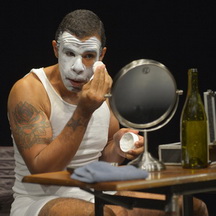Tragedy and farce go head on …
Galway’s Druid Theater is taking it on the road.
Currently, “it” is The Walworth Farce, the madcap play that makes so much sense by playwright Enda Walsh, brought to the Zellerbach Playhouse Nov. 18–23, as part of Cal Performances’ Theater series.
Our first impression of the play is the stage, sets by Sabine Dargent: divided into three shabby rooms, a central living room flanked by a bedroom and a kitchen. The ragged walls between them, papered in a dingy flesh color, are cut away, studs exposed. Old newspapers cover the windows. The box in which these council flat rooms are set is built in perspective: the floor raked, the walls and ceiling diminishing toward some distant solitary point.
That solitary point, however, exists not only in space but in time, for the three men who inhabit these rooms—a father and his two adult sons—are bound together by one fatal deed in their mutual past. What we watch in the course of the play is their attempt to rewrite this single action of familial tragedy by reenacting, over and over, a new narrative to explain why the three men had left Cork for London 17 years before.
Dinny (Michael Glenn Murphy), the father, is the creator of both the tragedy and the narrative, a farce of enormous comic dimensions. In this sweaty, frantic play within a play, everyone is competing for best actor. A trophy sits on the wall, waiting to be awarded, though it’s a given that Dinny will win, just as it is Dinny who is writer and director.
At first it seems that the core of Dinny’s farce is about the death of his mother, a hard case of Irish vitriol and alcohol, and that the story line is confused simply because everyone must play multiple parts: one of the sons, Blake (Raymond Scannell), who suffers from agoraphobia, plays all the female parts, as well as the occasional in-law, and the other son, Sean (Tadhg Murphy), seems to be playing Dinny himself, or is he Dinny’s dimwit brother, Paddy? Is the confusion because the story encompasses three generations, the members of which all seem to share the same names? Or is the confusion caused because in the elaborate square dance of relatives, shifting parts means that someone is left talking to a wig or decorated with a crooked mustache? Or is it that the suppositions of the farce too extreme: There is, for instance, no bus route from Cork to London.
From the very first, the death—whoever’s it is—seems questionable; even by the terms of farce it grows grandiosely improbable: Grandaddy, 96 and cavorting in a speed boat, hits a sea lion that flies through the air and hits a horse, which in turn flattens Granny. Voilà, two characters gone ancestral: R.I.P.
What the company presents in the play’s first half is metaphoric, laughable and absurd, but the point is clear: We rewrite our histories. We rewrite them in order to save our pride and our futures, but we force them on our families, destroying both our own and our children’s possibility for change and a happy, wholesome life.
The whole shaky edifice comes down in the play’s second half. Hayley (Mercy Ojelade), a girl who works at Tesco and has a huge crush on Sean, the trio’s one sojourner into the real world, knocks on the door, bringing with her the groceries that Sean mistakenly left behind in his daily outfitting of Dinny’s farce. Dinny’s tightly wound fantasy irrevocably unwinds in the presence of the outside world.
Both the staging and the acting of the Druid Theater production match the brilliance of the play: it’s all high octane. Director Mikel Murfi describes the play’s demands on the actors who must act “in high farcical form and then almost in an instant be able to live in deep psychological territories.”
Murfi, like Walsh, places the piece in the genetics of the Irish, which are “inherently deranged”: “Irish people are quite mad,” but he also points out that it’s a madness “that is very attractive, very playful.”
For the playwright the humor is saturated with pain. Walsh points out that the play runs on what he describes as the “dehumanizing life of actors,” who allow the audience to “feel catharsis through [their] pain.”
Either way it’s an original and insightful collaboration, shimmering with human emotions, tragic and comic.
—Jaime Robles
